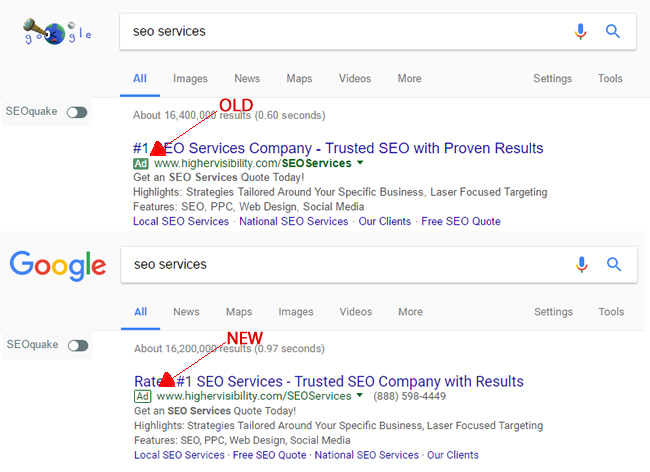After taking the 21st off from blogging due to a birthday getting in the way and then forgetting to hit “Publish” last night I decided to simply add today’s news in and cover the past 72 hours in search and SEO news so let’s get started …
Malie Ohye Leaving Google
Malie Ohye, 12 year Google veteran and in fact the host of the video related last week by Google on what folks should look for in an SEO. You can find that below as her last little gift to the community. As Matt Southern reported on Search Engine Journal, we don’t yet know where she’s going but I have a hunch we’ll be hearing about it soon. And now here’s what she had to say about hiring and SEO …
New Ad Label Rolling Out Globally
Ginny Marvin over at Search Engine Land reported earlier today on the global rollout of the new ad labels. We’re not seeing them yet on Google.ca (at least in my location) but they are visible in the US and other locations. Here’s what to results for “seo services” look like from each location:

Gboard For iOS Upgrades
Barry Schwartz reported for Search Engine Land on an upgrade to Google’s iOS keyboard. the new keyboard supports voice dialing, 15 more languages, voice typing and new emojis and doodles. Google’s obviously trying to get more and more information on what users are doing and understand better their iPhone users. Whether this is a play to try to woo iPhone users over to Google or just a data acquisition effort I’m not yet sure but it’s interesting to be sure.
Local SEO In 2017
There’s a great piece published earlier today by Casey Meraz over on the Moz blog on how local SEO has changed in 2017 and what you can do to take advantage of it. It’s a very good piece, especially for those who don’t keep up on local SEO specifically. I’d put it in the “must read” category even for veterans as it provides some great reminders on the questions we need to be asking ourselves and often forget to.
Virtual Offices No Longer Allowed As Service-Area Businesses
As Barry Schwartz reported on Search Engine Land, Google’s recently updated guidelines do not consider virtual offices to be service-area businesses and that you need to have the virtual office staffed during business hours. This is a necessary move by Google to close some loopholes that allowed people to operate out of specific locations whether they were there or not. If it didn’t need to be staffed then what’s to stop someone from getting a virtual office in all major locations they want to rank in just for that purpose?
Google Reduces Star Rating Threshold

Adam Heltzman reported on Search Engine Journal a change in Google’s star rating policies. Historically a business has needed five reviews for the stars to show up. That number has been dropped to one. They’re also changing how they determine the average. They historically have used the Bayesian average which considers the data for all businesses to determine the average. They are now switching that to using the approach we would generally expect which is to simply sum the total number of stars and divide by the number of reviews to determine the total. A lot of sites will thus see drops in their star ratings and the value given to 5-star ratings is reduced from it’s inflated pre-change formula.
Google Giving $11.5M To Racial Justice Groups
Jessica Guynn reported over on USA Today that Google is handing out $11.5 million in grants to organizations combating racial disparities in the criminal justice system. This doubles their current donations. On top of that Google engineers are putting time into improving the Center For Policing Equity’s database.

No, we’re not talking about a Warcraft game in the Play Store. As covered by Daniel Howley over on Yahoo! Finance, Google today made available Perspective API as part of Jigsaw’s Conversation AI project. Essentially the systems looks at comments and gives them a toxicity rating based on the likelihood that they would cause a user to leave a conversation. The goal is to give site owners with forums and other conversation points the ability to identify, filter or remove comments at specific thresholds. Very interesting and we wish the project all the luck in the world.
Google Just Rendered SHA-1 Obsolete
Reported on by Russell Brandom over on The Verge Google has just announced that they had broken one of the major algorithms in web encryption SHA-1. Fortunately very few sites use SHA-1 at this stage however it’s a major blow to current algorithms. In the end it took them the equivalent of 110 years of computing from a single GPU to accomplish the task. If that sounds like a lot it’s not. This of a hacker putting malware on a couple thousand machines to work as a net on the problem and suddenly the task does from 110 years down to about 20 days. What it’s doing isn’t so much cracking the algorithm as causing a collision. If you don’t know what that is it’s OK … I didn’t either. The collision occurs when a hashing function breaks and two files produce the same hash essentially allowing someone to insert any file they like as it will have the same hash as a legitimate file. This would break HTTPS as it would render useless the security within. Fortunately the majority of us are not secured by SHA-1 but I have a hunch I know what Google’s working on next.
